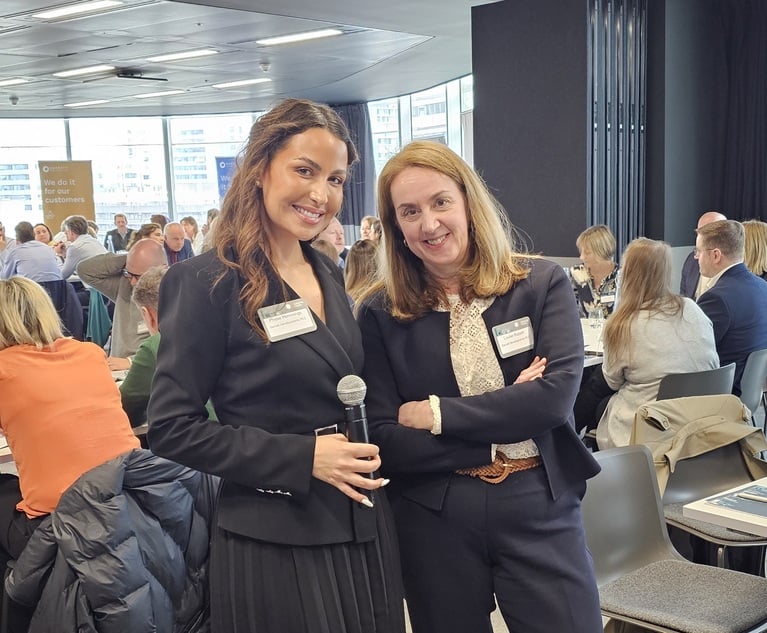
The changing role of the GC in 2015
Economic and regulatory changes, developments in the legal market, the increasing volume and complexity of workload for legal teams and the advent of technology are changing how general counsel work, how they see themselves and their position in the organisation. In this article, Thomson Reuters Legal UK & Ireland looks at how being a GC has changed, and how GCs are managing the evolving requirements of their job.
May 14, 2015 at 03:25 PM
5 minute read
GCs are increasingly providing organisations with strategic as well as legal advice and this is a major factor in repositioning in-house legal departments at the centre of the business.
The shift from simply providing legal advice to a complex role that encompasses strategy and leadership has been driven by a combination of economic factors and budgetary considerations as well as broader choice and increased competition in legal services provision.
In many corporations, the GC is leading and managing what is effectively a business within a business, deciding which tasks to retain in-house and which to allocate to external counsel or alternative legal service providers. The GC role is further complicated by globalisation, which exposes businesses to multiple regulatory regimes, and by the speed and frequency of regulatory change.
Although the majority of in-house legal teams comprise between two and ten lawyers, many GCs are in effect sole practitioners, advising on matters ranging from routine contracts and transactions to business critical strategic decisions and crisis management and are recognised as 'more than lawyers'.
For the first time in three years, The Lawyer 'In-House Attitudes Report' 2014 found that changing economic conditions were not in-house counsels' primary challenge. This indicates a new optimism in the light of economic recovery.
However, the growing regulatory burden has increased the legal workload and budgetary restrictions and static staffing levels have maintained internal pressure on the legal function. For many companies, legal spend represents a substantial budget item, which can increase dramatically if the company is involved in M&A and/or litigation.
One popular way of controlling legal spend is to retain more work in-house and reduce reliance on external counsel, whose costs can be relatively high and unpredictable thanks to law firms' pricing model, which is generally based on the billable hour.
However, businesses requiring specialist expertise still need to instruct external firms and the right technology can play a significant role in helping GCs manage their legal spend and improve internal processes and productivity.
Tom Brown, head of legal for UK and Ireland at PayPal, who heads a seven-strong legal team, says: "We retain the majority of our work in-house and we use external counsel for intricate instructions or when we require country expertise. We have a very tight panel of firms that I trust to do a good job."
Some law firms offer their clients collaboration software. While corporates tend to invest in sophisticated IT architecture that is superior to that of most law firms they instruct, many GCs acknowledge that law firms have excellent legal research and know-how resources.
Corporate legal departments are increasingly deploying software that enables them to track the progress of the work they undertake in-house as well as that outsourced to external firms and to monitor billing against budgets. The resulting management information – which includes, but is not confined to billing data – is used to guide decision making, improve processes and manage and control legal expenditure.
The GC role has evolved as the legal function has shifted to the heart of the business. Brown is a member of PayPal's regional management team. He describes the GC role as the conscience of the business. "Everyone comes to the GC for legal advice and approval, so we are aware of what is going on across the entire business, which is why lawyers often make good COOs and CEOs", he adds.
PayPal's legal function relies on software to manage documents and billing. The expanded GC role has led to lawyers becoming more business-like.
As Rob Thomas, a former lawyer and co-founder of Serengeti Tracker, a legal solution from Thomson Reuters, observes: "The language of business is accounting and numbers. Technology solutions help in-house lawyers understand company financials and keep track of spending."
Serengeti data can be used to create management reports, for example to analyse spending on particular types of matter. It is about enhancing visibility across the business. Typically, a system like Serengeti will cost around 1% of spending; and savings in the first year are expected to be over 10%.
The Lawyer 'In-House Attitudes Report' reflects that the broader role of the GC, which carries responsibilities beyond the legal implications of business decisions, is most obvious in the drive for efficiency, value and commercial awareness that is shaping the relationship between corporate legal departments and their external advisers.
Looking ahead, company directors and GCs generally expect GCs' strategic input into business decisions to increase over the next five to ten years. The drive for efficiency and value when it comes to legal spend and the complex regulatory considerations that are bringing GCs' responsibility closer to corporate boards highlight the importance of transparency in corporate governance and decision making.
Investing in the right technology is not just about managing the pressure on prices and processes; it also supports the GC's critical role in managing corporate risk and strategic decisions.
For more information about Serengeti Tracker please visit serengetilaw.com/international/uk
This content has been archived. It is available through our partners, LexisNexis® and Bloomberg Law.
To view this content, please continue to their sites.
Not a Lexis Subscriber?
Subscribe Now
Not a Bloomberg Law Subscriber?
Subscribe Now
NOT FOR REPRINT
© 2024 ALM Global, LLC, All Rights Reserved. Request academic re-use from www.copyright.com. All other uses, submit a request to [email protected]. For more information visit Asset & Logo Licensing.
You Might Like
View All
Broadcom Hires From Nuclear Giant to Appoint French Legal Head

GCs Say They are Getting 'Edged Out' of UK Boardrooms

'I Won’t Name the Firm, But...'—Barratt Redrow's Legal Head on External Counsel Red Flags
Trending Stories
- 1Trump Media Accuses Purchaser Rep of Extortion, Harassment After Merger
- 2Judge Slashes $2M in Punitive Damages in Sober-Living Harassment Case
- 3Georgia Supreme Court Honoring Troutman Pepper Partner, Former Chief Justice
- 4Insurer Not Required to Cover $29M Wrongful Death Judgment, Appeals Court Rules
- 5Slideshow: Jewish Bar Association of Georgia Marks 1st Year With Hanukkah Party
Who Got The Work
Michael G. Bongiorno, Andrew Scott Dulberg and Elizabeth E. Driscoll from Wilmer Cutler Pickering Hale and Dorr have stepped in to represent Symbotic Inc., an A.I.-enabled technology platform that focuses on increasing supply chain efficiency, and other defendants in a pending shareholder derivative lawsuit. The case, filed Oct. 2 in Massachusetts District Court by the Brown Law Firm on behalf of Stephen Austen, accuses certain officers and directors of misleading investors in regard to Symbotic's potential for margin growth by failing to disclose that the company was not equipped to timely deploy its systems or manage expenses through project delays. The case, assigned to U.S. District Judge Nathaniel M. Gorton, is 1:24-cv-12522, Austen v. Cohen et al.
Who Got The Work
Edmund Polubinski and Marie Killmond of Davis Polk & Wardwell have entered appearances for data platform software development company MongoDB and other defendants in a pending shareholder derivative lawsuit. The action, filed Oct. 7 in New York Southern District Court by the Brown Law Firm, accuses the company's directors and/or officers of falsely expressing confidence in the company’s restructuring of its sales incentive plan and downplaying the severity of decreases in its upfront commitments. The case is 1:24-cv-07594, Roy v. Ittycheria et al.
Who Got The Work
Amy O. Bruchs and Kurt F. Ellison of Michael Best & Friedrich have entered appearances for Epic Systems Corp. in a pending employment discrimination lawsuit. The suit was filed Sept. 7 in Wisconsin Western District Court by Levine Eisberner LLC and Siri & Glimstad on behalf of a project manager who claims that he was wrongfully terminated after applying for a religious exemption to the defendant's COVID-19 vaccine mandate. The case, assigned to U.S. Magistrate Judge Anita Marie Boor, is 3:24-cv-00630, Secker, Nathan v. Epic Systems Corporation.
Who Got The Work
David X. Sullivan, Thomas J. Finn and Gregory A. Hall from McCarter & English have entered appearances for Sunrun Installation Services in a pending civil rights lawsuit. The complaint was filed Sept. 4 in Connecticut District Court by attorney Robert M. Berke on behalf of former employee George Edward Steins, who was arrested and charged with employing an unregistered home improvement salesperson. The complaint alleges that had Sunrun informed the Connecticut Department of Consumer Protection that the plaintiff's employment had ended in 2017 and that he no longer held Sunrun's home improvement contractor license, he would not have been hit with charges, which were dismissed in May 2024. The case, assigned to U.S. District Judge Jeffrey A. Meyer, is 3:24-cv-01423, Steins v. Sunrun, Inc. et al.
Who Got The Work
Greenberg Traurig shareholder Joshua L. Raskin has entered an appearance for boohoo.com UK Ltd. in a pending patent infringement lawsuit. The suit, filed Sept. 3 in Texas Eastern District Court by Rozier Hardt McDonough on behalf of Alto Dynamics, asserts five patents related to an online shopping platform. The case, assigned to U.S. District Judge Rodney Gilstrap, is 2:24-cv-00719, Alto Dynamics, LLC v. boohoo.com UK Limited.
Featured Firms
Law Offices of Gary Martin Hays & Associates, P.C.
(470) 294-1674
Law Offices of Mark E. Salomone
(857) 444-6468
Smith & Hassler
(713) 739-1250








